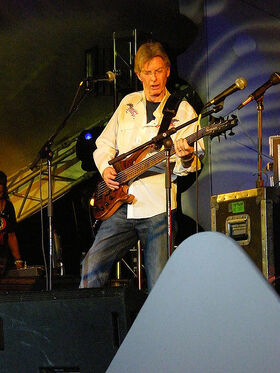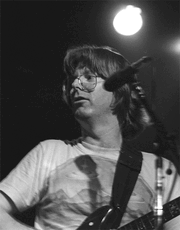Phillip Chapman Lesh (born March 15, 1940 in Berkeley, California) is a musician and a founding member of the Grateful Dead, with whom he played bass guitar throughout their 30-year career. After the band's disbanding in 1995, Lesh continued the tradition of Grateful Dead family music with side project Phil Lesh and Friends, which paid homage to the Dead's music by playing their originals, common covers, and the songs of the members of his band. Phil & Friends helped keep a legitimate entity for the band's music to continue but have been on hiatus since 2008. Recently, Lesh has been performing with Furthur alongside former Dead bandmate Bob Weir.

Music[]
Although Lesh started out as a violin player, in high school he switched to trumpet. Studying under Bob Hansen, he had a keen interest in avant-garde classical music and free jazz; he also studied under the Italian modernist Luciano Berio at Mills College (classmates included minimalist composer Steve Reich, and future Dead keyboardist Tom Constanten). While still a college student he met then-bluegrass banjo player Jerry Garcia. Despite antipodal musical interests, they formed a friendship and eventually Lesh was talked into becoming the bass guitarist for Garcia's new rock group, then known as the Warlocks. According to Lesh, the first song he rehearsed with the band was "I Know You Rider". He joined them for their third or fourth gig (memories vary) and stayed until the end. Lesh noticed that another group had made a record under the name Warlocks when he found their single on Columbia Records at a record store. It turns out that the band "The Warlocks" on that single also ended up changing their name to The Velvet Underground. He suggested to the other band members that they change their name. Lesh had never played bass before joining the band, which meant he learned "on the job", but it also meant he had no preconceived attitudes about the instrument's traditional "rhythm section" role. Indeed, he has said that his playing style was influenced more by Bach counterpoint than by rock or soul bass players (although one can also hear the fluidity and power of a jazz bassist such as Charles Mingus or Jimmy Garrison in Lesh's work, along with stylistic allusions to fellow San Francisco psychedelic-era bassist Jack Casady). Lesh, along with other musicians that include James Jamerson, Paul McCartney, Roger Waters, Brian Wilson, Jack Bruce, John Entwistle, and Jack Casady, was an innovator in the new role that the electric bass developed during the mid-1960s. These players adopted a more melodic, contrapuntal approach to the instrument; before this, bass players in rock had generally played a conventional timekeeping role within the beat of the song, and within (or underpinning) the song's harmonic or chord structure. While not abandoning these aspects, Lesh took his own improvised excursions during a song or instrumental. This was a characteristic aspect of the so-called San Francisco Sound in the new rock music. In many Dead jams, Lesh's bass is, in essence, as much a lead instrument as Garcia's guitar. Lesh was not a prolific composer or singer with the Grateful Dead, although some of the songs he did contribute—"New Potato Caboose", "Box of Rain", "Unbroken Chain", and "Pride of Cucamonga"—are among the best-loved in the band's repertoire. Lesh's high tenor voice contributed greatly to the Grateful Dead's four-part harmony sections in their group vocals in the early days of the band, until he relinquished singing high parts to Donna Godchaux. In the 1980s, he resumed singing, but as a baritone. His interest in avant-garde music was a crucial influence on the Dead, pushing them into new territory, and he was an essential part of the group and its mystique, best summed-up in the Deadhead truism: "If Phil's on, the band's on". Also, a snippet of tape of Lesh on trumpet in college can be heard on the Bob Weir-composed "Born Cross-Eyed."
After the disbanding of the Grateful Dead, Lesh continued to play with its offshoots The Other Ones and The Dead, as well as performing with his own band, Phil Lesh and Friends. One memorable tour paired him with Bob Dylan.
Additionally, Lesh and his wife Jill administer their charitable organization, the Unbroken Chain Foundation. The couple have two children together, Grahame and Brian. Both Grahame and Brian follow in their father's musical footsteps, and the three frequently play together both publicly and privately.
In 1998 Lesh underwent a liver transplant as a result of chronic hepatitis C infection; since then, he has become an

outspoken advocate for organ donor programs and when performing regularly encourages members of the audience to become organ donors (tracks identified as the "donor rap" on the live recordings of his various performances).
In April, 2005, Lesh's book Searching for the Sound: My Life with the Grateful Dead was published. The book takes its name from the lyrics of a Grateful Dead song entitled "Unbroken Chain," from their album From the Mars Hotel. "Unbroken Chain" is one of the few songs Lesh sings. This is the only book about the Grateful Dead written by a member of the band. On October 26, 2006, Lesh released a statement on his official website, revealing that he had been diagnosed with prostate cancer — the disease that killed his father — and would be undergoing an operation in December 2006 to have it removed. On December 7, 2006, Lesh released a statement stating that he had undergone prostate surgery with the cancer being removed. In March 2008, Phil Lesh did a guest voice on the Comedy Central series Lil' Bush on the second season episode "Big Pharm". In 2009, Lesh went back on tour with the remaining members of The Grateful Dead and called it The Reunion Tour. Following the 2009 summer tour Lesh proceeded to found a new band with Bob Weir named Furthur, which debuted in September 2009. Phil Lesh & Friends have not performed since New Year's Eve 2008-2009.